We ask you, urgently: don't scroll past this
Dear readers, Catholic Online was de-platformed by Shopify for our pro-life beliefs. They shut down our Catholic Online, Catholic Online School, Prayer Candles, and Catholic Online Learning Resources essential faith tools serving over 1.4 million students and millions of families worldwide. Our founders, now in their 70's, just gave their entire life savings to protect this mission. But fewer than 2% of readers donate. If everyone gave just $5, the cost of a coffee, we could rebuild stronger and keep Catholic education free for all. Stand with us in faith. Thank you.Help Now >
What the Catechism Says
Advent
"Come, Lord Jesus," 2853
2853 Victory over the "prince of this world"(169) was won once for all at the Hour when Jesus freely gave himself up to death to give us his life. This is the judgment of this world, and the prince of this world is "cast out."(170) "He pursued the woman"(171) but had no hold on her: the new Eve, "full of grace" of the Holy Spirit, is preserved from sin and the corruption of death (the Immaculate Conception and the Assumption of the Most Holy Mother of God, Mary, ever virgin). "Then the dragon was angry with the woman, and went off to make war on the rest of her offspring."(172) Therefore the Spirit and the Church pray: "Come, Lord Jesus,"(173) since his coming will deliver us from the Evil One.
Coming of Christ and the Last Judg ment, 1040
1040 The Last Judgment will come when Christ returns in glory. Only the Father knows the day and the hour; only he determines the moment of its coming. Then through his Son Jesus Christ he will pronounce the final word on all history. We shall know the ultimate meaning of the whole work of creation and of the entire economy of salvation and understand the marvelous ways by which his Providence led everything towards its final end. The Last Judgment will reveal that God's justice triumphs over all the injustices committed by his creatures and that God's love is stronger than death.(628)
Coming of God's kingdom brought on by signs and miracles, 542, 1505
542 Christ stands at the heart of this gathering of men into the "family of God". By his word, through signs that manifest the reign of God, and by sending out his disciples, Jesus calls all people to come together around him. But above all in the great Paschal mystery - his death on the cross and his Resurrection - he would accomplish the coming of his kingdom. "And I, when I am lifted up from the earth, will draw all men to myself." Into this union with Christ all men are called.(250)
1505 Moved by so much suffering Christ not only allows himself to be touched by the sick, but he makes their miseries his own: "He took our infirmities and bore our diseases.".(112) But he did not heal all the sick. His healings were signs of the coming of the Kingdom of God. They announced a more radical healing: the victory over sin and death through his Passover. On the cross Christ took upon himself the whole weight of evil and took away the "sin of the world,".(113) of which illness is only a consequence. By his passion and death on the cross Christ has given a new meaning to suffering: it can henceforth configure us to him and unite us with his redemptive Passion.
Corning of God's kingdom and the defeat of Satan's kingdom, 550
550 The coming of God's kingdom means the defeat of Satan's: "If it is by the Spirit of God that I cast out demons, then the kingdom of God has come upon you."(277) Jesus' exorcisms free some individuals from the domination of demons. They anticipate Jesus' great victory over "the ruler of this world".(278) The kingdom of God will be definitively established through Christ's cross: "God reigned from the wood."(279)
Coming of the Holy Spirit and Pentecost, 729, 732
729 Only when the hour has arrived for his glorification does Jesus promise the coming of the Holy Spirit, since his Death and Resurrection will fulfill the promise made to the fathers.(116) The Spirit of truth, the other Paraclete, will be given by the Father in answer to Jesus' prayer; he will be sent by the Father in Jesus' name; and Jesus will send him from the Father's side, since he comes from the Father. The Holy Spirit will come and we shall know him; he will be with us for ever; he will remain with us. The Spirit will teach us everything, remind us of all that Christ said to us and bear witness to him. The Holy Spirit will lead us into all truth and will glorify Christ. He will prove the world wrong about sin, righteousness, and judgment.
732 On that day, the Holy Trinity is fully revealed. Since that day, the Kingdom announced by Christ has been open to those who believe in him: in the humility of the flesh and in faith, they already share in the communion of the Holy Trinity. By his coming, which never ceases, the Holy Spirit causes the world to enter into the "last days," the time of the Church, the Kingdom already inherited though not yet consummated.
We have seen the true Light, we have received the heavenly Spirit, we have found the true faith: we adore the indivisible Trinity, who has saved us.(123)
Expectation of the coming of Christ, 840
840 And when one considers the future, God's People of the Old Covenant and the new People of God tend towards similar goals: expectation of the coming (or the return) of the Messiah. But one awaits the return of the Messiah who died and rose from the dead and is recognized as Lord and Son of God; the other awaits the coming of a Messiah, whose features remain hidden till the end of time; and the latter waiting is accompanied by the drama of not knowing or of misunderstanding Christ Jesus.
Preparation for Christ's coming, 522-24
522 The coming of God's Son to earth is an event of such immensity that God willed to prepare for it over centuries. He makes everything converge on Christ: all the rituals and sacrifices, figures and symbols of the "First Covenant".(195) He announces him through the mouths of the prophets who succeeded one another in Israel. Moreover, he awakens in the hearts of the pagans a dim expectation of this coming.
523 St. John the Baptist is the Lord's immediate precursor or forerunner, sent to prepare his way.(196) "Prophet of the Most High", John surpasses all the prophets, of whom he is the last.(197) He inaugurates the Gospel, already from his mother's womb welcomes the coming of Christ, and rejoices in being "the friend of the bridegroom", whom he points out as "the Lamb of God, who takes away the sin of the world".(198) Going before Jesus "in the spirit and power of Elijah", John bears witness to Christ in his preaching, by his Baptism of conversion, and through his martyrdom.(199)
524 When the Church celebrates the liturgy of Advent each year, she makes present this ancient expectancy of the Messiah, for by sharing in the long preparation for the Savior's first coming, the faithful renew their ardent desire for his second coming.(200) By celebrating the precursor's birth and martyrdom, the Church unites herself to his desire: "He must increase, but I must decrease."(201)
"Thy kingdom come," 2816-21, 2859
2816 In the New Testament, the word basileia can be translated by "kingship" (abstract noun), "kingdom" (concrete noun) or "reign" (action noun). The Kingdom of God lies ahead of us. It is brought near in the Word incarnate, it is proclaimed throughout the whole Gospel, and it has come in Christ's death and Resurrection. The Kingdom of God has been coming since the Last Supper and, in the Eucharist, it is in our midst. The kingdom will come in glory when Christ hands it over to his Father:
It may even be . . . that the Kingdom of God means Christ himself, whom we daily desire to come, and whose coming we wish to be manifested quickly to us. For as he is our resurrection, since in him we rise, so he can also be understood as the Kingdom of God, for in him we shall reign.(86)
2817 This petition is "Marana tha," the cry of the Spirit and the Bride: "Come, Lord Jesus."
Even if it had not been prescribed to pray for the coming of the kingdom, we would willingly have brought forth this speech, eager to embrace our hope. In indignation the souls of the martyrs under the altar cry out to the Lord: "O Sovereign Lord, holy and true, how long before you judge and avenge our blood on those who dwell upon the earth?" For their retribution is ordained for the end of the world. Indeed as soon as possible, Lord, may your kingdom come!(87)
2818 In the Lord's Prayer, "thy kingdom come" refers primarily to the final coming of the reign of God through Christ's return.(88) But, far from distracting the Church from her mission in this present world, this desire commits her to it all the more strongly. Since Pentecost, the coming of that Reign is the work of the Spirit of the Lord who "complete[s] his work on earth and brings us the fullness of grace."(89)
2819 "The kingdom of God [is] righteousness and peace and joy in the Holy Spirit."(90) The end-time in which we live is the age of the outpouring of the Spirit. Ever since Pentecost, a decisive battle has been joined between "the flesh" and the Spirit.(91)
Only a pure soul can boldly say: "Thy kingdom come." One who has heard Paul say, "Let not sin therefore reign in your mortal bodies," and has purified himself in action, thought and word will say to God: "Thy kingdom come!"(92)
2820 By a discernment according to the Spirit, Christians have to distinguish between the growth of the Reign of God and the progress of the culture and society in which they are involved. This distinction is not a separation. Man's vocation to eternal life does not suppress, but actually reinforces, his duty to put into action in this world the energies and means received from the Creator to serve justice and peace.(93)
2821 This petition is taken up and granted in the prayer of Jesus which is present and effective in the Eucharist; it bears its fruit in new life in keeping with the Beatitudes.(94)
2859 By the second petition, the Church looks first to Christ's return and the final coming of the Reign of God. It also prays for the growth of the Kingdom of God in the "today" of our own lives.
Transfiguration as a foretaste of Christ's glorious coming, 556
556 On the threshold of the public life: the baptism; on the threshold of the Passover: the Transfiguration. Jesus' baptism proclaimed "the mystery of the first regeneration", namely, our Baptism; the Transfiguration "is the sacrament of the second regeneration": our own Resurrection.(300) From now on we share in the Lord's Resurrection through the Spirit who acts in the sacraments of the Body of Christ. The Transfiguration gives us a foretaste of Christ's glorious coming, when he "will change our lowly body to be like his glorious body."(301) But it also recalls that "it is through many persecutions that we must enter the kingdom of God":(302)
Peter did not yet understand this when he wanted to remain with Christ on the mountain. It has been reserved for you, Peter, but for after death. For now, Jesus says: "Go down to toil on earth, to serve on earth, to be scorned and crucified on earth. Life goes down to be killed; Bread goes down to suffer hunger; the Way goes down to be exhausted on his journey; the Spring goes down to suffer thirst; and you refuse to suffer?"(303)
Uncertainty of the time of Christ's glorious coming, 673-74, 1040, 2772
673 Since the Ascension Christ's coming in glory has been imminent,(566) even though "it is not for you to know times or seasons which the Father has fixed by his own authority."(567). This eschatological coming could be accomplished at any moment, even if both it and the final trial that will precede it are "delayed".(568)
674 The glorious Messiah's coming is suspended at every moment of history until his recognition by "all Israel", for "a hardening has come upon part of Israel" in their "unbelief" toward Jesus.(569) St. Peter says to the Jews of Jerusalem after Pentecost: "Repent therefore, and turn again, that your sins may be blotted out, that times of refreshing may come from the presence of the Lord, and that he may send the Christ appointed for you, Jesus, whom heaven must receive until the time for establishing all that God spoke by the mouth of his holy prophets from of old."(570) St. Paul echoes him: "For if their rejection means the reconciliation of the world, what will their acceptance mean but life from the dead?"(571) The "full inclusion" of the Jews in the Messiah's salvation, in the wake of "the full number of the Gentiles",(572) will enable the People of God to achieve "the measure of the stature of the fullness of Christ", in which "God may be all in all".(573)
1040 The Last Judgment will come when Christ returns in glory. Only the Father knows the day and the hour; only he determines the moment of its coming. Then through his Son Jesus Christ he will pronounce the final word on all history. We shall know the ultimate meaning of the whole work of creation and of the entire economy of salvation and understand the marvelous ways by which his Providence led everything towards its final end. The Last Judgment will reveal that God's justice triumphs over all the injustices committed by his creatures and that God's love is stronger than death.(628)
2772 From this unshakeable faith springs forth the hope that sustains each of the seven petitions, which express the groanings of the present age, this time of patience and expectation during which "it does not yet appear what we shall be."(22) The Eucharist and the Lord's Prayer look eagerly for the Lord's return, "until he comes."(23)
See Consummation; Expectation ------------------------------------------------
- 22 1 Jn 3:2; cf. Col 3:4.
- 23 1 Cor 11:26.
- 86 St. Cyprian, De Dom. orat. 13:PL 4,528A.
- 87 Tertullian, De orat. 5:PL 1,1159A; cf. Heb 4:11; Rev 6:9; 22:20.
- 88 Cf. Titus 2:13.
- 89 Roman Missal, Eucharistic Prayer IV,118.
- 90 Rom 14:17.
- 91 Cf. Gal 5:16-25.
- 92 St. Cyril of Jerusalem, Catech. myst. 5,13:PG 33,1120A; cf. Rom 6:12.
- 93 Cf. GS 22; 32; 39; 45; EN 31.
- 94 Cf. Jn 17:17-20; Mt 5:13-16; 6:24; 7:12-13.
- 112 Mt 8:17; cf. Isa 53:4.
- 113 Jn 1:29; cf. Isa 53:4-6.
- 116 Cf. Jn 14:16-17,26; 15:26; 16:7-15; 17:26.
- 123 Byzantine liturgy, Pentecost Vespers, Troparion, repeated after communion.
- 169 Jn 14:30.
- 170 Jn 12:31; Rev 12:10.
- 171 Rev 12:13-16.
- 172 Rev 12:17.
- 173 Rev 22:17,20.
- 195 Heb 9:15.
- 196 Cf. Acts 13:24; Mt 3:3.
- 197 Lk 1:76; cf. 7:26; Mt 11:13.
- 198 Jn 1 29; cf. Acts 1:22; Lk 1:41; 16:16; Jn 3:29.
- 199 Lk 1:17; cf. Mk 6:17-29.
- 200 Cf Rev 22:17.
- 201 Jn 3:30.
- 250 Jn 12:32; cf. LG 3.
- 277 Mt 12:26, 28.
- 278 Jn 12:31; cf. Lk 8:26-39.
- 279 LH, Lent, Holy Week, Evening Prayer, Hymn Vexilla Regis: "Regnavit a ligno Deus."
- 300 St. Thomas Aquinas, STh III, 45, 4, ad 2.
- 301 Phil 3:21.
- 302 Acts 14:22.
- 303 St. Augustine, Sermo 78, 6: PL 38, 492-493; cf. Lk 9:33.
- 566 Cf. Rev 22:20.
- 567 Acts 1:7; Cf. Mk 13:32.
- 568 Cf. Mt 24:44; 1 Thess 5:2; 2 Thess 2:3-12.
- 569 Rom 11:20-26; cf. Mt 23:39.
- 570 Acts 3:19-21.
- 571 Rom 11:15.
- 572 Rom 11:12, 25; cf. Lk 21:24.
- 573 Eph 4:13; 1 Cor 15:28.
- 628 Cf. Song 8:6.
More Advent & Christmas
Advent & Christmas 2024
Begins Sunday, December 1, 2024
Ends on Sunday, December 24, 2024
"And the angel answered her, 'The Holy Spirit will come upon you, and the power of the Most High will overshadow you; therefore the child to be born will be called holy—the Son of God.'"
Christ the King
Sunday, November 24, 2024
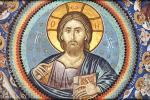 Christ the King Day is a Catholic celebration that takes place on the last Sunday of the liturgical year in the Catholic faith. continue reading
Christ the King Day is a Catholic celebration that takes place on the last Sunday of the liturgical year in the Catholic faith. continue reading
Advent 2024 starts on Sunday, December 1, 2024
Advent starts four Sundays before Christmas every year.Immaculate Conception of the Virgin Mary
[holy day of obligation]
Monday, December 9, 2024
![Immaculate Conception of the Virgin Mary[holy day of obligation] Image of Immaculate Conception of the Virgin Mary[holy day of obligation]](https://www.catholic.org/files/images/media//14812140994558_150.jpg) Blessed Virgin Mary in the first instance of her conception, by a singular privilege and grace granted by God, in view of the merits of Jesus Christ, ... continue reading
Blessed Virgin Mary in the first instance of her conception, by a singular privilege and grace granted by God, in view of the merits of Jesus Christ, ... continue reading
Advent 2025 ends on Sunday December 24, 2025
Advent ends on Christmas Eve, the day before Christmas, every year.Christmas
Birth of Our Lord Jesus
[holy day of obligation]
Monday, December 25, 2024
![ChristmasBirth of Our Lord Jesus[holy day of obligation] Image of ChristmasBirth of Our Lord Jesus[holy day of obligation]](https://www.catholic.org/files/images/media//15226932365_150.jpg) Christmas is an annual festival commemorating the birth of Jesus Christ. continue reading
Christmas is an annual festival commemorating the birth of Jesus Christ. continue reading
The Solemnity of Mary, Mother of God
[holy day of obligation]
Wednesday, January 1, 2025
![The Solemnity of Mary, Mother of God[holy day of obligation] Image of The Solemnity of Mary, Mother of God[holy day of obligation]](https://www.catholic.org/files/images/media/2022/16665677875_150.jpg) The Solemnity of Mary, the Holy Mother of God is a feast day of the Blessed Virgin Mary under the aspect of her motherhood of Jesus Christ. continue reading
The Solemnity of Mary, the Holy Mother of God is a feast day of the Blessed Virgin Mary under the aspect of her motherhood of Jesus Christ. continue reading
Epiphany
Monday, January 6, 2025
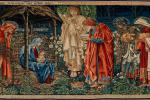 The Epiphany signifies the visitation of the Biblical Magi to the Baby Jesus. continue reading
The Epiphany signifies the visitation of the Biblical Magi to the Baby Jesus. continue reading
Advent Reflections
Reflection for every day of Advent
 Advent is a period of waiting, like Lent. We are called to obtain the Sacrament of Reconciliation, to pray and fast, as we await the arrival of our ... continue reading
Advent is a period of waiting, like Lent. We are called to obtain the Sacrament of Reconciliation, to pray and fast, as we await the arrival of our ... continue reading
Advent Calendar
Every day of Advent
 An Advent calendar has become a tradition for many families when celebrating Advent and the Christmas season. continue reading
An Advent calendar has become a tradition for many families when celebrating Advent and the Christmas season. continue reading
Advent Candle
24 Days of December
 An Advent candle is a neat way to mark off the days until Christmas. Such candles are commonly found in churches and sometimes in homes. continue reading
An Advent candle is a neat way to mark off the days until Christmas. Such candles are commonly found in churches and sometimes in homes. continue reading
Advent Wreath
Each Sunday of Advent
 The wreath's symbolism of the advent (coming) of Light into the world is clear. The gradual lighting of the four candles, one on each Sunday of the ... continue reading
The wreath's symbolism of the advent (coming) of Light into the world is clear. The gradual lighting of the four candles, one on each Sunday of the ... continue reading
Advent & Christmas Classes
14 Free Classes - Mobile Friendly
 You’re joining our global classroom. Thousands of students from all over the world, each with their own unique story, learn at their own pace on ... continue reading
You’re joining our global classroom. Thousands of students from all over the world, each with their own unique story, learn at their own pace on ... continue reading
Advent & Christmas PDFs
FREE - Printable - Catholic
 Free Advent & Christmas PDFs for anyone, anywhere; Use in your Parish Church - School - Bulletin Inserts. continue reading
Free Advent & Christmas PDFs for anyone, anywhere; Use in your Parish Church - School - Bulletin Inserts. continue reading
Christmas Gifts
Free Shipping $70+
 Make This Christmas Special with Gifts from Catholic Online Shopping. continue reading
Make This Christmas Special with Gifts from Catholic Online Shopping. continue reading
Nativity Scene
Holy Family
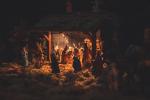 The Nativity Scene is a meaningful expression for our religious faith. With it, we provide a captivating visual focus during the Christmas season. continue reading
The Nativity Scene is a meaningful expression for our religious faith. With it, we provide a captivating visual focus during the Christmas season. continue reading
St. Nicholas
December 6th
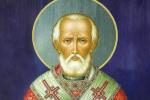 The true story of Santa Claus begins with Saint Nicholas. continue reading
The true story of Santa Claus begins with Saint Nicholas. continue reading
Advent? What is it all about
 The word Advent derives from the Latin word meaning coming. The Lord is coming. We may reflect that every year at this time we celebrate his coming... continue reading
The word Advent derives from the Latin word meaning coming. The Lord is coming. We may reflect that every year at this time we celebrate his coming... continue readingThe Christmas Story
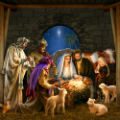 To become the mother of the Savior, Mary "was enriched by God with gifts appropriate to such a role." The angel Gabriel at the moment of... continue reading
To become the mother of the Savior, Mary "was enriched by God with gifts appropriate to such a role." The angel Gabriel at the moment of... continue readingAdvent Daily Readings
 The weeks of Advent remind us to set aside some of the hectic business of the holiday season, and to quietly reflect on the promise of the baby... continue reading
The weeks of Advent remind us to set aside some of the hectic business of the holiday season, and to quietly reflect on the promise of the baby... continue readingMore Advent & Christmas
Bishop Strickland's Christmastide Message: A Call to Repentance and Courageous Discipleship
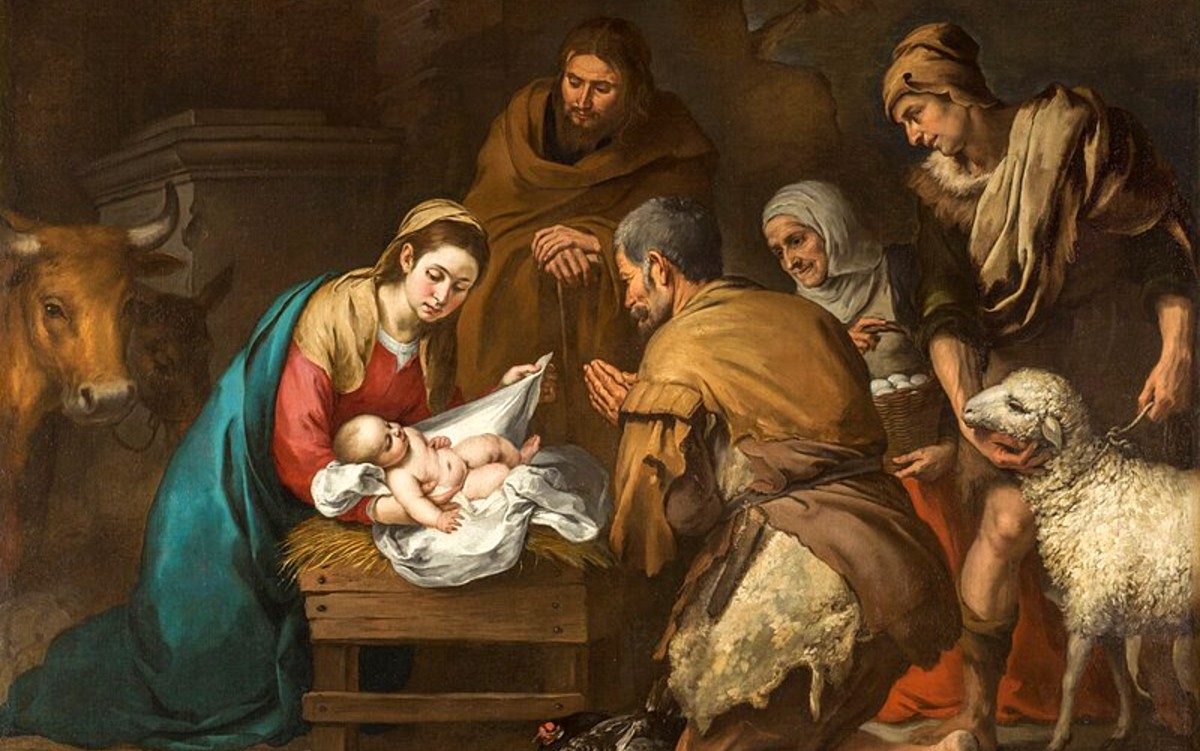
As we begin a new year, Bishop Strickland offers us a powerful reflection to carry through Christmastide and beyond. His words remind us of ... continue reading
The Deacon Saint Stephen the Proto-Martyr is a Model for all Christians

In the Catholic Church, Christmas is celebrated for eight days (Octave, from the Latin Octava) and opens up into a wonderful liturgical ... continue reading
Love is Born on Christmas Morn, and the World is Born Anew Watch

The Gospel passages proclaimed at the Vigil and the Midnight Mass of Christmas root the Nativity of the Lord, in the family history and ... continue reading
Rediscovering the True Importance of Christmas for Catholics

As the world becomes increasingly secularized, the true significance of Christmas can often be overshadowed by commercialism, distractions, ... continue reading
5 Ways to keep Jesus in your Christmas celebrations this year
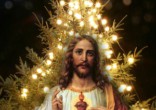
Christmas is a magical time of year when decorations line the streets, children are suddenly behaving and the Post Office struggles to keep ... continue reading
Get your oven mitts ready, it's time to bake Christmas cookies! Watch

Logs are burning in the fireplace and a sweet holiday tune escapes from the stereo. Christmas is here and it's time to break out those eggs ... continue reading
Join the Movement
When you sign up below, you don't just join an email list - you're joining an entire movement for Free world class Catholic education.

-

- Stations of the Cross
- Easter / Lent
- 5 Lenten Prayers
- Ash Wednesday
- Living Lent
- 7 Morning Prayers
- Mysteries of the Rosary
- Litany of the Bl. Virgin Mary
- Popular Saints
- Popular Prayers
- Female Saints
- Saint Feast Days by Month
- Pray the Rosary
Stop Lying: You Don’t Represent ‘The American People’ — You Represent Your District
Easter 2025: Liberation Day – Time to Reclaim Our Faith, Our Church, and Our Future
Bishop Joseph Strickland’s Letter to President Trump: A Call for Peace in the Middle East
Daily Catholic
 Daily Readings for Monday, March 31, 2025
Daily Readings for Monday, March 31, 2025 St. Benjamin: Saint of the Day for Monday, March 31, 2025
St. Benjamin: Saint of the Day for Monday, March 31, 2025 Prayer for God's Help in Daily Actions: Prayer of the Day for Friday, March 14, 2025
Prayer for God's Help in Daily Actions: Prayer of the Day for Friday, March 14, 2025 Daily Readings for Sunday, March 30, 2025
Daily Readings for Sunday, March 30, 2025 St. Peter Regulatus: Saint of the Day for Sunday, March 30, 2025
St. Peter Regulatus: Saint of the Day for Sunday, March 30, 2025- To Perceive Animals as God's Gifts: Prayer of the Day for Thursday, March 13, 2025
![]()
Copyright 2025 Catholic Online. All materials contained on this site, whether written, audible or visual are the exclusive property of Catholic Online and are protected under U.S. and International copyright laws, © Copyright 2025 Catholic Online. Any unauthorized use, without prior written consent of Catholic Online is strictly forbidden and prohibited.
Catholic Online is a Project of Your Catholic Voice Foundation, a Not-for-Profit Corporation. Your Catholic Voice Foundation has been granted a recognition of tax exemption under Section 501(c)(3) of the Internal Revenue Code. Federal Tax Identification Number: 81-0596847. Your gift is tax-deductible as allowed by law.

















 Daily Readings for Monday, March 31, 2025
Daily Readings for Monday, March 31, 2025 St. Benjamin: Saint of the Day for Monday, March 31, 2025
St. Benjamin: Saint of the Day for Monday, March 31, 2025 Prayer for God's Help in Daily Actions: Prayer of the Day for Friday, March 14, 2025
Prayer for God's Help in Daily Actions: Prayer of the Day for Friday, March 14, 2025 St. Peter Regulatus: Saint of the Day for Sunday, March 30, 2025
St. Peter Regulatus: Saint of the Day for Sunday, March 30, 2025